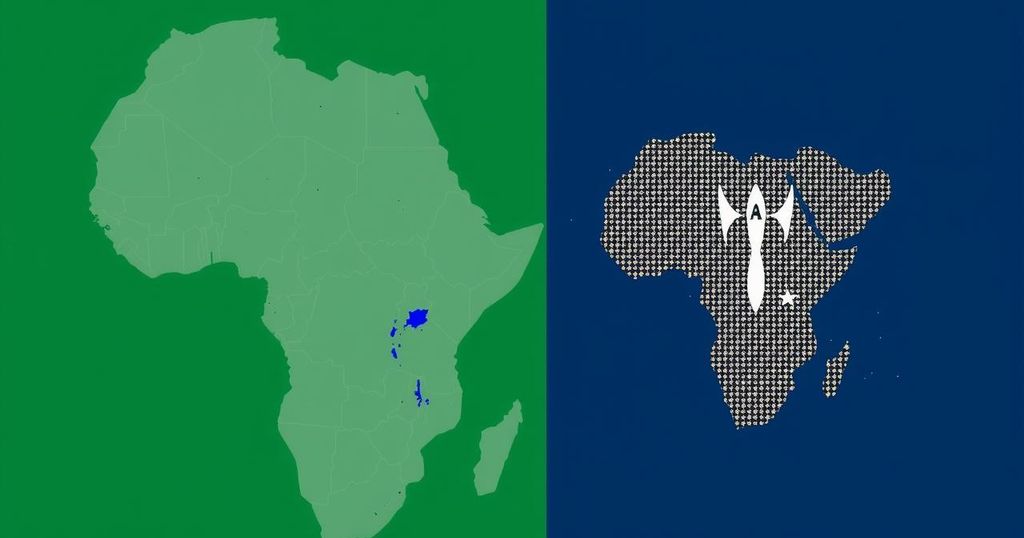Congo and Kenya Highlighted as East Africa’s Most Risky Investment Destinations
The Democratic Republic of Congo and Kenya have been ranked as the riskiest investment destinations in East Africa, according to the Africa Risk-Reward Index 2024. Key issues impacting these ratings include political instability, social unrest, and economic challenges. Rwanda is highlighted as a safer investment location, while Kenya’s credit rating has deteriorated due to recent fiscal policy controversies. The DRC faces humanitarian crises exacerbated by ongoing conflicts.
Recent findings indicate that the Democratic Republic of Congo (DRC) and Kenya are identified as the most precarious investment environments within East Africa, primarily due to a combination of political, social, and economic challenges. According to the latest Africa Risk-Reward Index 2024, produced by Control Risks and Oxford Economics Africa and published on October 30, DRC has received a risk score of 7.6 out of 10 for the period ending September 30, 2024, closely followed by Kenya with a score of 6.06. Other countries in the region, such as Uganda and Tanzania, were rated at 6.01 and 5.37, respectively, whereas Rwanda emerged as the safest destination with a risk score of 5.11. The scoring methodology evaluates both risk and reward on a scale from 1 to 10, with a higher rating indicating greater risk or reward. The reward aspect assesses medium-term economic growth forecasts, economic scale, structure, and demographics, emphasizing that strong economic growth correlates with increased investment opportunities. The report highlights that Kenya’s reward score has declined slightly from 5.33 to 5.25, while its risk score has worsened from 5.8 to 6.06, contributing to a 0.34 point fall in its overall risk-reward score. Similarly, the DRC’s reward score fell from 5.88 to 5.65, and its risk score increased from 7.53 to 7.6, leading to a 0.3 point decrease in its risk-reward score. The findings also reflect troubling events in Kenya, where the global rating agency S&P Global has downgraded the nation’s credit rating partly due to the debacle surrounding the Finance Bill 2024. This action marks the third credit agency to lower Kenya’s fiscal credibility, following Fitch and Moody’s, who expressed doubts regarding the country’s revenue forecast amid an escalating debt situation. Increasing anti-government sentiment in Kenya is exacerbated by discontent surrounding tax reforms initiated by President William Ruto, especially following protests against the Finance Bill 2024. The Government’s taxation policies are perceived by many as contradictory to Ruto’s campaign promises aimed at enhancing the welfare of everyday citizens amid rising inflation and a declining currency. In the DRC, escalating violence, particularly in the eastern regions due to conflicts with groups like the M23, has compounded humanitarian distress, displacing millions and restricting access to essential necessities in overcrowded shelters. Overall, these evaluations position DRC and Kenya as the least attractive investment prospects in East Africa, with Rwanda noted as a comparatively stable option for potential investors.
The Africa Risk-Reward Index evaluates the investment landscape of various countries in Africa, providing critical insights into both the risks and potential rewards associated with investment in these nations. This index helps investors to gauge the volatility and stability of markets within East Africa, highlighting the importance of economic, political, and social factors in their decision-making processes.
In summary, the Democratic Republic of Congo and Kenya have been identified as the riskiest investment destinations in East Africa, reflecting increasing political instability, social unrest, and economic challenges. Rwanda, contrastingly, stands out as a safer alternative. Investors must weigh these factors carefully when considering opportunities in the region, with a keen eye on evolving conditions that may impact the risk-reward dynamics.
Original Source: www.theeastafrican.co.ke




Post Comment